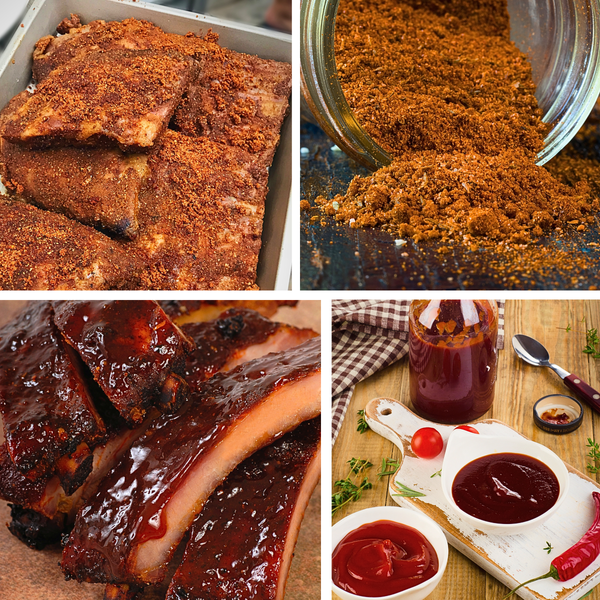Key Takeaways:
- Personalization: Making your own barbecue sauce allows for customization to suit your taste preferences.
- Quality Control: Homemade barbecue sauce ensures you know exactly what ingredients are included, avoiding preservatives and high fructose corn syrup.
- Cost-Effective: Creating your own sauce can be more economical than purchasing premium store-bought options.
Introduction
Barbecue sauce is a staple in many households, especially during grilling season. But is it worth it to make your own barbecue sauce? This question often arises when considering the convenience of store-bought options versus the potential benefits of homemade versions. In this article, we will explore the advantages and disadvantages of making your own barbecue sauce, provide a detailed homemade BBQ sauce recipe, and discuss various ways to use your creation.

The Joy of Customization
One of the primary reasons to make homemade barbecue sauce is the ability to customize it to your liking. Whether you prefer a sweeter sauce with more brown sugar or a spicy BBQ sauce with a kick of red pepper flakes, the choice is entirely yours. You can experiment with different ingredients like apple cider vinegar, smoked paprika, and molasses flavor to create a sauce that perfectly complements your favorite recipes.
Moreover, making your own sauce allows you to adjust the consistency and flavor profile. If you like a thicker sauce, you can reduce the heat and let it simmer longer. For a tangier taste, add more acidic flavors like red wine vinegar or white vinegar. The possibilities are endless, and the result is a sauce that is uniquely yours.
Quality Control
When you make homemade BBQ sauce, you have complete control over the ingredients. This means you can avoid preservatives, high fructose corn syrup, and other additives commonly found in store-bought sauces. Instead, you can use fresh garlic, tomato sauce, and other pantry staples to create a healthier, more natural product.
Additionally, making your own sauce allows you to cater to dietary restrictions. For example, you can create a gluten-free version by using gluten-free soy sauce or coconut aminos. This level of control ensures that your sauce is not only delicious but also aligns with your dietary needs and preferences.
Cost-Effectiveness
Another significant advantage of making your own barbecue sauce is the cost savings. While premium store-bought sauces can be expensive, homemade versions are often more economical. By using ingredients you likely already have in your pantry, such as tomato ketchup, garlic powder, and onion powder, you can create a delicious sauce without breaking the bank.
Furthermore, making a large batch of sauce and storing it in an airtight container or mason jar can provide you with a supply that lasts up to two weeks. This not only saves money but also ensures you always have a tasty sauce on hand for your grilled meats, pulled pork, or BBQ chicken pizza.

The Basic Homemade BBQ Sauce Recipe
Creating a homemade BBQ sauce recipe is simpler than you might think. Here’s a basic recipe to get you started:
Ingredients:
- 2 cups tomato ketchup
- 1/2 cup apple cider vinegar
- 1/4 cup Worcestershire sauce
- 1/4 cup dark brown sugar
- 2 tablespoons molasses
- 1 tablespoon smoked paprika
- 1 tablespoon garlic powder
- 1 tablespoon onion powder
- 1 teaspoon mustard powder
- 1 teaspoon black pepper
- 1/2 teaspoon red pepper flakes or my favorite, ground chipotle peppers (optional for heat)
- 1/2 teaspoon liquid smoke (optional for smoky flavor)
Instructions:
- In a medium saucepan, combine all ingredients.
- Bring to a simmer over medium heat, stirring occasionally.
- Reduce the heat to low and let it simmer for 20-30 minutes until it reaches the desired consistency.
- Allow the sauce to cool, then store it in an airtight container or mason jar in the refrigerator.
This basic recipe can be adjusted to suit your taste. For a sweeter sauce, add more brown sugar or maple syrup. If you prefer a tangier flavor, increase the amount of apple cider vinegar or add a splash of red wine vinegar.
Experimenting with Flavors
One of the joys of making barbecue sauce is experimenting with different flavors. You can create a variety of sauces by tweaking the basic recipe. For example, adding Dijon mustard and crushed garlic can give your sauce a savory flavor, while incorporating chili powder and cayenne pepper can add a spicy kick.
You can also experiment with different types of vinegar, such as balsamic or rice vinegar, to create unique flavor profiles. The key is to start with the basic recipe and adjust the ingredients to suit your taste preferences. This experimentation can lead to discovering your own signature sauce that stands out at any barbecue.

Using Homemade BBQ Sauce
Homemade barbecue sauce is incredibly versatile and can be used in a variety of dishes. It’s perfect for marinating meats, as a dipping sauce, or as a topping for grilled vegetables. Here are a few ideas to get you started:
BBQ Chicken Pizza
Spread a generous amount of your homemade BBQ sauce on a pizza crust, then top with shredded chicken, red onions, and mozzarella cheese. Bake until the crust is golden and the cheese is bubbly for a delicious BBQ chicken pizza.
Pulled Pork
Slow-cook a pork shoulder with your homemade sauce for tender, flavorful pulled pork. Serve on buns with coleslaw for a classic barbecue sandwich.
Chicken Wings
Toss chicken wings in your sauce and bake or grill until crispy. Serve with celery sticks and blue cheese dressing for a crowd-pleasing appetizer.
Storing Homemade BBQ Sauce
Proper storage is essential to maintain the freshness and flavor of your homemade barbecue sauce. Once the sauce has cooled, transfer it to an airtight container or mason jar. Store it in the refrigerator, where it will keep for up to two weeks.
If you’ve made a large batch and want to extend its shelf life, consider freezing the sauce in smaller portions. This way, you can thaw only what you need, ensuring the sauce remains fresh and flavorful.

Comparing Homemade and Store-Bought Sauces
While homemade barbecue sauce offers numerous benefits, it’s essential to consider the convenience of store-bought options. Brands like Sweet Baby Ray’s provide a consistent, ready-to-use product that can save time and effort. However, these sauces often contain preservatives, high fructose corn syrup, and other additives that some may prefer to avoid.
On the other hand, homemade sauces allow for customization and control over ingredients, resulting in a healthier, more personalized product. The choice ultimately depends on your priorities and preferences.
Common Ingredients in BBQ Sauces
Understanding the common ingredients in barbecue sauces can help you create a well-balanced homemade version. Here are a few key components:
Tomato Base
Most barbecue sauces start with a tomato base, such as tomato ketchup or tomato sauce. This provides a rich, savory foundation for the sauce.
Sweeteners
Sweeteners like dark brown sugar, molasses, and maple syrup add depth and balance to the sauce. Adjust the amount based on your desired sweetness.
Vinegars
Vinegars, such as apple cider vinegar, red wine vinegar, and white vinegar, add tanginess and help balance the sweetness. Experiment with different types to find your preferred flavor.

Spices and Seasonings
Spices like smoked paprika, garlic powder, onion powder, mustard powder, and black pepper add complexity and depth to the sauce. Adjust the quantities to suit your taste.
Liquid Smoke
For a smoky flavor, consider adding a small amount of liquid smoke. This ingredient can enhance the overall taste, especially if you’re not using a smoker.
Health Considerations
Making your own barbecue sauce allows you to create a healthier product by avoiding preservatives and high fructose corn syrup. You can also control the amount of sugar and salt, making it easier to adhere to dietary restrictions.
For those with gluten sensitivities, using gluten-free soy sauce or coconut aminos ensures the sauce is safe to consume. Additionally, you can use natural sweeteners like honey or maple syrup instead of granulated sugar for a more wholesome option.
The Role of Acidity in BBQ Sauce
Acidity is a crucial element when you make barbecue sauce, providing a tangy balance to the sweetness and smokiness. Vinegars, such as apple cider or white vinegar, are commonly used to achieve this balance. Adding a splash of lemon juice or even a bay leaf can elevate the flavor profile. For those who prefer a milder tang, balsamic vinegar offers a sweeter alternative. Experimenting with different acidic ingredients can help you discover the best BBQ sauce that suits your palate.
Incorporating acidity not only enhances flavor but also acts as a preservative, helping to store homemade BBQ sauce for longer periods. This is particularly beneficial if you make large batches. When you review your recipe, consider the type and amount of acidic ingredients used. A well-balanced barbecue sauce recipe can transform your dishes, whether you're grilling hot dogs or marinating chicken. Remember, the right acidity can make all the difference in achieving that perfect tangy taste.

Incorporating Heat: Spicy BBQ Sauce Variations
For those who love a kick, adding heat to your barbecue sauce can be a game-changer. You can start by adding cayenne pepper or hot sauce to your base recipe. If you prefer a more complex heat, consider using ground mustard or yellow mustard. These ingredients not only add spice but also depth to the flavor. A dash of olive oil can help blend these spices smoothly into your sauce.
Creating a spicy BBQ sauce allows you to cater to different taste preferences. Whether you're hosting a barbecue or simply enjoying a meal at home, a spicy sauce can add excitement to your dishes. For a milder heat, you can use Sweet Baby Ray's hot sauce or even a favorite ketchup with a bit of a kick. Remember, the key is to taste as you go, ensuring the heat level is just right for your audience. This approach makes your homemade sauce versatile and appealing to a broader range of palates.
Tips for Perfecting Your Sauce
Creating the perfect barbecue sauce takes practice and experimentation. Here are a few tips to help you along the way:
Start with a Basic Recipe
Begin with a basic recipe and adjust the ingredients to suit your taste. This allows you to understand the balance of flavors and make necessary tweaks.
Taste as You Go
Taste the sauce at different stages of cooking to ensure it’s developing the desired flavor. Adjust the seasoning as needed to achieve the perfect balance.
Let It Simmer
Allow the sauce to simmer for at least 20-30 minutes to let the flavors meld together. This step is crucial for developing a rich, well-rounded taste.

Common Mistakes to Avoid
When making homemade barbecue sauce, it’s essential to avoid common mistakes that can affect the final product. Here are a few pitfalls to watch out for:
Overloading with Sweeteners
While sweeteners are essential for balancing the sauce, adding too much can result in an overly sweet product. Start with a small amount and adjust as needed.
Skipping the Simmering Step
Simmering the sauce allows the flavors to meld together and develop complexity. Skipping this step can result in a sauce that tastes flat and one-dimensional.
Not Tasting as You Go
Tasting the sauce at different stages of cooking ensures you can adjust the seasoning as needed. This step is crucial for achieving the perfect balance of flavors.
Enhancing Store-Bought Sauces
If you prefer the convenience of store-bought sauces but want to add a personal touch, consider enhancing them with a few simple ingredients. Here are some ideas:
Add Fresh Garlic
Fresh garlic can add a robust flavor to store-bought sauces. Mince a few cloves and stir them into the sauce for an extra kick.
Incorporate Spices
Enhance the flavor by adding spices like smoked paprika, chili powder, or cayenne pepper. This can elevate the taste and make the sauce more unique.
Sweeten with Natural Ingredients
If the sauce is too tangy, add a bit of honey or maple syrup to balance the flavors. This can create a more well-rounded taste.

Pairing BBQ Sauce with Different Meats
Different meats pair well with various types of barbecue sauce. Here are some suggestions for pairing your homemade sauce with different proteins:
Chicken
A sweeter sauce with a hint of spice pairs well with chicken. Consider adding more brown sugar and a touch of cayenne pepper for a balanced flavor.
Pork
Pork pairs well with tangy and slightly sweet sauces. Use apple cider vinegar and molasses to create a sauce that complements the richness of the meat.
Beef
For beef, a smoky and savory sauce works best. Incorporate smoked paprika and liquid smoke to enhance the natural flavors of the meat.
Creative Uses for BBQ Sauce
Barbecue sauce isn’t just for grilling. Here are some creative ways to use your homemade sauce:
Pizza Sauce
Use your barbecue sauce as a base for pizza. Spread it on the crust and top with your favorite ingredients for a unique twist on traditional pizza.
Dipping Sauce
Serve your sauce as a dipping sauce for chicken tenders, fries, or vegetables. It adds a flavorful kick to any snack.
Marinade
Use the sauce as a marinade for meats. Let the meat soak in the sauce for a few hours before grilling to infuse it with flavor.

Summary
Creating homemade barbecue sauce offers numerous benefits, including the ability to customize the flavor, control the ingredients, and save money. By following a basic recipe and experimenting with different ingredients, you can create a sauce that perfectly suits your taste preferences. Whether you use it for grilling, as a dipping sauce, or in creative recipes, homemade barbecue sauce is a versatile and delicious addition to your culinary repertoire.
FAQ
Q: How long can I store homemade barbecue sauce?
A: Homemade barbecue sauce can be stored in an airtight container or mason jar in the refrigerator for up to two weeks. For longer storage, consider freezing the sauce in smaller portions.
Q: Can I make a gluten-free barbecue sauce?
A: Yes, you can make a gluten-free barbecue sauce by using gluten-free soy sauce or coconut aminos. Ensure all other ingredients are also gluten-free.
Q: How can I make my barbecue sauce spicier?
A: To make your barbecue sauce spicier, add ingredients like cayenne pepper, red pepper flakes, or hot sauces. Adjust the amount based on your desired level of heat.










